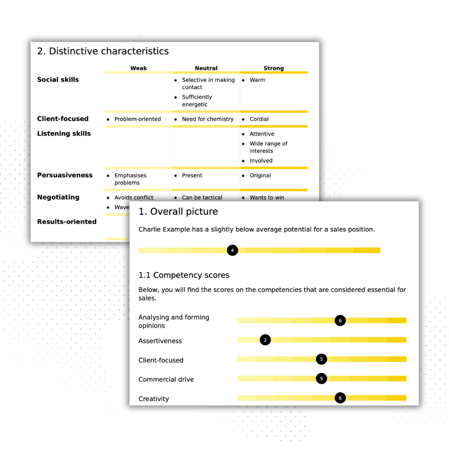Measuring Sales Potential - Assessments to Select the Best Talent
In today's fast-paced business world, hiring top-performing sales professionals is critical to achieving success. However, identifying the candidates with the most potential can be a tricky task.

That's where sales assessments come in. These tools help measure a candidate's sales potential by evaluating their skills, experience, and personality traits. By using sales assessments, companies can select the best talent that not only meets the job requirements but also fits into the company culture. This approach can lead to increased revenue, improved customer satisfaction, and a more motivated sales team.
In this article, we'll explore how sales assessments work, what they measure, and how they can help your organisation hire top-performing sales professionals. Whether you're an HR manager or a sales director looking to hire the best talent, this article will provide valuable insights on measuring sales potential through sales assessments.
The Importance of Sales Assessments in Selecting Top Talent
Sales assessments help to evaluate the skills, knowledge, and experience of sales candidates. They are an essential tool for selecting top-performing sales professionals. Sales assessments help to identify the most qualified candidates for a sales role. They also help to predict how successful a candidate will be in a sales role.
Sales assessments are important because they help to reduce the risk of hiring the wrong candidate. A bad hire can be costly for a company, both in terms of time and money. Sales assessments help to ensure that the candidates selected have the skills and experience needed to succeed in a sales role. They also help to identify any potential development areas that may need to be addressed.
By using sales assessments, companies can streamline the hiring process and reduce the time it takes to fill a position. This can lead to a more efficient and effective hiring process, which can save time and money in the long run.
Types of Sales Assessments
There are several types of sales assessments available. Each type of assessment measures different skills, knowledge, and experience. Some of the most common types of sales assessments include:
Personality Assessments
Personality assessments measure a candidate's personality traits, such as extroversion and emotional stability. These assessments can help to identify candidates who have the right personality traits for a sales role.
Competency Potential Assessments
Competency potential assessments are the results of a personality test and interpret in line with a candidate’s likely behavior in the work environment. Organisations can select their key sales competencies or use the turnkey research-based profile. The report then provides an indication of a candidate’s potential for each sales competency, as well as an overall sales potential index.
Download a sample report for Lumenii’s Sales Potential Index, to see how we measure and hire for sales success.
Skills Assessments
Skills assessments measure a candidate's demonstrated sales skills, such as their ability to close deals and build relationships with customers. These assessments can help to identify candidates who have the necessary skills to succeed in a sales role.
Knowledge Assessments
Knowledge assessments measure a candidate's knowledge of sales techniques, products, and services. They are especially useful when a candidate needs to sell products in a technical or complex environment.
Situational Judgment Tests
Situational judgment tests (SJT’s) measure a candidate's response to real-life scenarios that they may encounter in a sales role. SJT’s ask candidates to choose their suggested response to a scenario from a list of options, with the aim of measuring their problem-solving skills.

Benefits of Using Sales Assessments in the Hiring Process
There are many benefits to using sales assessments in the hiring process. Some of the most significant benefits include:
Improved Hiring Decisions
Sales assessments help to identify the most qualified candidates for a sales role by identifying their potential at the outset. With these insights, companies can make better hiring decisions, which in turn leads to a more successful and cohesive sales team.
Reduced Turnover
Sales potential assessments help to identify candidates who are a good fit for the organisation’s culture. Employees who fit in well with the company culture are more likely to stay long-term, leading to better engagement and retention.
Better Organisational Performance
Sales professionals are the engine that drives the organisation’s performance. When investing in hiring, developing, and retaining a top-performing sales team, organisations often see a positive impact on their bottom line via increased sales and revenue.
Improved Customer Satisfaction
By hiring top-performing sales professionals, companies can improve customer satisfaction. Sales professionals who have the skills and experience needed to succeed in their role are more likely to provide excellent customer service, with a positive long-term impact on satisfaction and client relationships.
Best Practices for Conducting Sales Assessments
To ensure that sales assessments are effective, there are several best practices that companies should follow:
Define the Job Requirements
Before conducting a sales assessment, it's important to define the job requirements. This ensures that the assessment provides an accurate measurement of the skills, knowledge, and experience that are essential for success in the role.
Define a Competency Profile
Once the requirements of the role are clear, the next step is to choose the 6 to 8 competencies that are essential for success. A competency profile will help your organisation to determine what to measure and provide business-relevant results.
Use Multiple Assessments
To get a well-rounded view of a candidate's potential, it's best to use multiple assessments. Using multiple assessments can help to identify strengths and weaknesses in different areas, providing a more comprehensive view of the candidate.
For example, Lumenii’s comprehensive Select provides insight into competency potential, motivators, cognitive ability and Learning Agility, which provide a holistic picture of a candidate’s role fit.
Keep the Assessments Consistent
To ensure that the results are reliable, it's important to keep the assessments consistent. The same assessments and reports should be used for all candidates.
Measuring the ROI of Using Sales Assessments
To measure the ROI of using sales assessments, companies should track the following metrics:
Time to Hire
Using sales assessments can help to reduce the time it takes to fill a sales position. By tracking the time to hire, companies can measure the impact of using sales assessments on the hiring process.
Employee Turnover
By tracking employee turnover, companies can measure the impact of sales assessments on retention.
Sales Revenue
Using sales assessments can help to increase sales performance, and in turn, revenue. Tracking revenue over time can help to demonstrate the ROI of sales assessments in the selection and promotion process.
Conclusion to Measuring Sales Potential
Measuring sales potential through sales assessments is critical for selecting top-performing sales professionals. By evaluating a candidate's personality, competency potential, skills, and experience, sales assessments can help to identify the most qualified candidates for a role. Sales assessments can also help to improve the hiring process, reduce turnover, increase revenue, and improve customer satisfaction. By following best practices and using the right sales assessment tools, companies can make better hiring decisions and build a more successful sales team.


Author
Caitlin is a Senior Psychologist & Marketing Specialist. Her focus is on research, thought leadership in the areas of Agility, engagement & talent management.